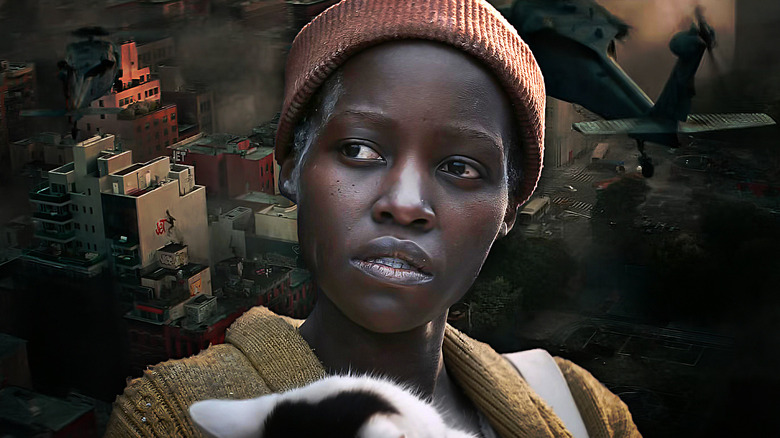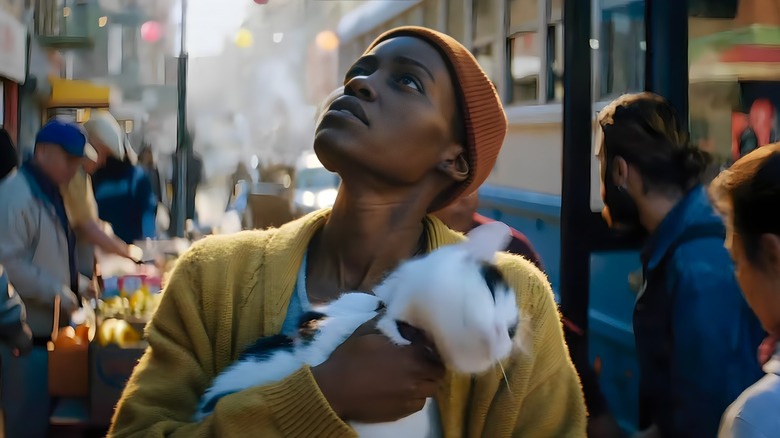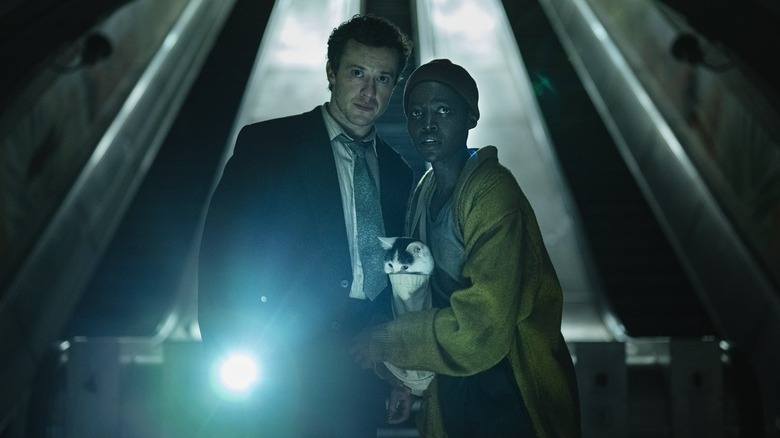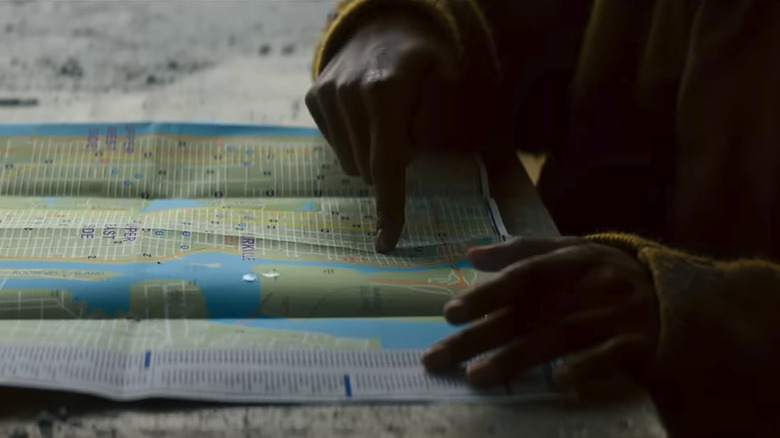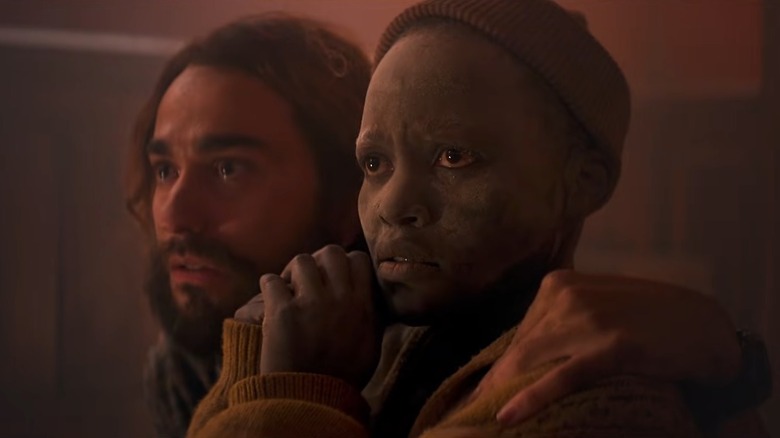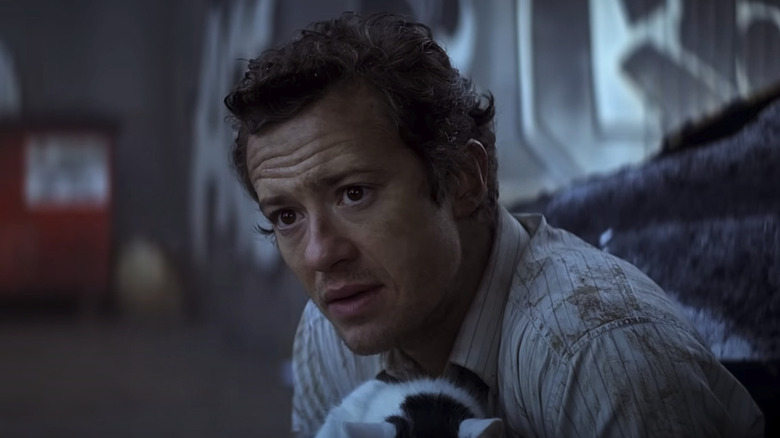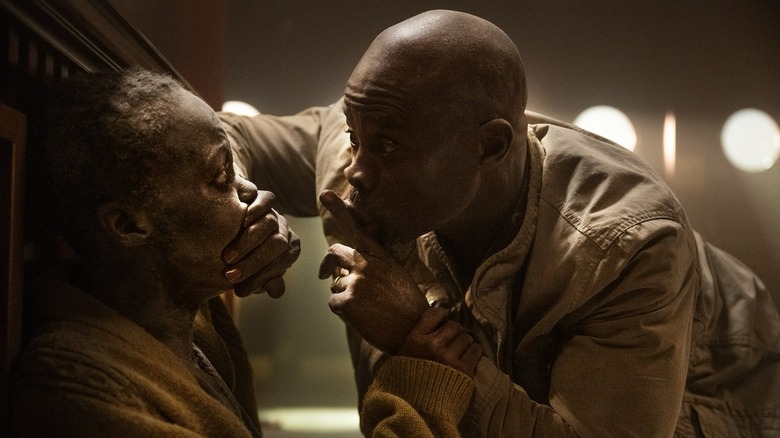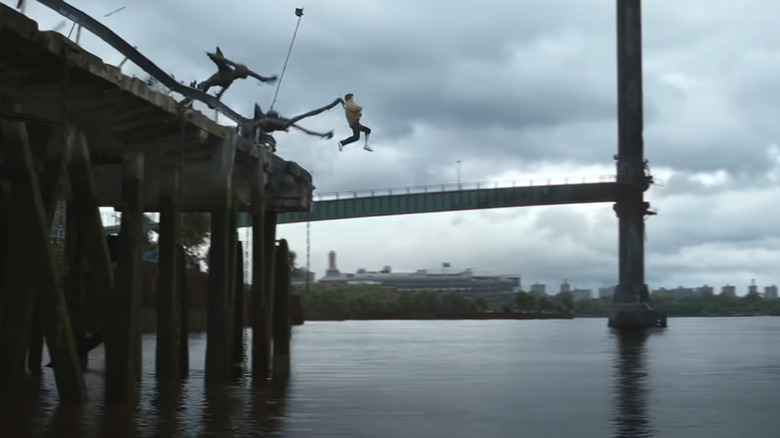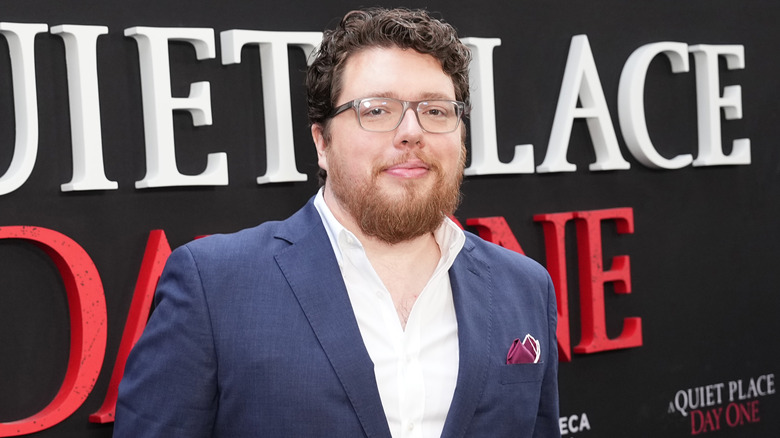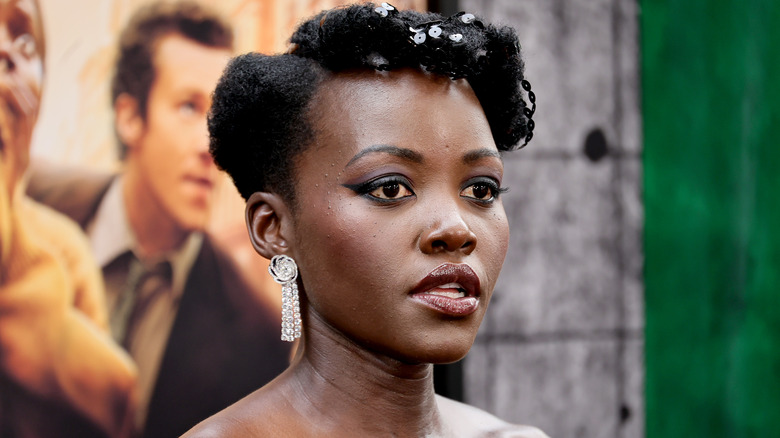The Ending Of A Quiet Place: Day One Explained
Contains spoilers for "A Quiet Place: Day One"
In June 2024, moviegoers were taken back to the quietly revolutionary world of "A Quiet Place," an environment so terrifyingly silent it may make you afraid to speak even as the credits roll — though you'll probably be dying to, given the insane ending of "A Quiet Place: Day One." It's impressive that a prequel like "Day One" can still land such impactful narrative punches despite taking place before and almost entirely separately from the story of the Abbott family, fleshing out the growing "A Quiet Place" timeline. For those in need of a refresher, the Abbotts are the rural New York family (led by John Krasinski's Lee and Emily Blunt's Evelyn) who fought for survival in the first two films.
Though "A Quiet Place Part II" provided an exciting glimpse into the early days of the alien invasion via an opening sequence set in the Abbotts' small town of Millbrook, New York, "Day One" raises the stakes dramatically by throwing newcomers Lupita Nyong'o and Joseph Quinn into the heart of New York City. As the film's opening text forebodes, the metropolis emits a continuous sound level of 90 decibels, comparable to the noise of a hairdryer. This places our heroes in more danger than we've ever seen, ultimately making for a thrilling — and surprisingly meaningful — movie with a great ending.
What you need to remember about A Quiet Place: Day One
Taking place before the main storylines of the first two "A Quiet Place" films, "A Quiet Place: Day One" follows Sam (Lupita Nyong'o), a poet and cancer patient who finds herself stranded in the heart of New York City after legions of extra-terrestrial, audio-sensitive hostiles (known as Death Angels to fans) descend on the island of Manhattan. Far from the hospice care facility where she had previously resigned herself to a nihilistic existence as she awaits the inevitable, Sam (alongside her scene-stealing cat Frodo) embarks on a personal mission to have one last slice of pizza at Patsy's, a real, historical Harlem pizzeria the character used to visit as a young girl.
Like all great stories of apocalyptic societies, Sam's journey brings her close to those around her — and even closer to loss. Early in the film, she's forced to watch silently as Reuben (her nurse and unspoken friend, played by an almost unrecognizable Alex Wolff) is killed while trying to turn off a noisy power generator in their shelter. She also encounters the tough but caring Henri (Djimon Hounsou, reprising his role from "A Quiet Place Part II"), a father who accidentally kills a hysterical survivor while trying to keep them quiet. Sam's most important connection is arguably with Eric (Joseph Quinn), a law student stranded even further from his home in the United Kingdom. Too terrified to travel alone, Eric convinces Sam to take him with her on her journey to Patsy's.
What happened at the end of A Quiet Place: Day One?
As one would expect, Sam's relationship with Eric evolves from reluctant traveling companions to intimate friends. He risks his life time and again to protect her and her cat, retrieve vital medicine to keep her moving, and ultimately finish their journey to Patsy's. Sadly, like much of New York by that point, Patsy's is destroyed beyond recognition, leaving not so much as a cold slice of pepperoni for them to savor. Eric salvages the moment by taking Sam to the jazz club where her father used to play piano. As she reminisces about her childhood (and charges her iPod with an iHome she takes from behind the bar), Eric retrieves several slices of pizza from a different pizzeria. They eat, drink, and perform magic tricks together, enjoying a rare moment of happiness in an otherwise dour trek.
Soon afterwards, Sam and Eric see an evacuation boat full of survivors lingering at a nearby harbor. Satisfied by her final trip to New York, Sam insists that they take advantage of the opportunity and escape for good. However, when the noise generated by the ship attracts a group of Death Angels to their location, Sam gives Frodo to Eric and sprints in the opposite direction, creating as much noise as possible to draw the monsters away and cover his escape. On the ship, Henri sees the commotion and successfully gets the captain to stop the vessel long enough for Eric to throw himself into the water and be pulled aboard safely (with Frodo, of course). Finally at peace, Sam blasts music through her speakers and presumably allows herself to be killed by a Death Angel.
Why is Sam willing to die for pizza?
Sam is unique to many of the characters we meet both in this and previous "A Quiet Place" films in that her world is already coming to an end before "Day One." As is made clear by the poem "Bad Math" (which she published before she seemingly retreated from the world), the most traumatizing aspect of Sam's terminal cancer diagnosis is the constantly shifting date of her death. Though she and her doctors are certain that she's going to die, she keeps outliving their estimates.
It may seem like a cause for joy, but for Sam — whose surprising survival apparently does not indicate improving health — it simply robs her of what little control she has over her own fate and leaves her endlessly dreading a demise she can't predict. Ironically, this is the world everyone wakes up in on Day Two, when they realize the Death Angels are there to stay.
This is why Sam is uniquely poised to have a strangely positive and cathartic emotional journey through the end of the world as we know it. As she confesses her last-ditch pizza plan to Reuben shortly before his demise, it seems as though what she's really revealing is a desire to meet death on her own terms. Both of them know the odds of a cancer patient surviving an on-foot trek to Harlem during an alien invasion are low — that's why they're both close to tears when this conversation takes place.
Does Sam get the ending she expected?
At the end of the film, Sam is not only able to complete her mission and save someone else's life, she's also able to choose the exact moment of her death. Writer-director Michael Sarnoski (who came up with the story with some help from John Krasinski) emphasizes this important moment in Sam's character arc by presenting her great heroic sacrifice in a rather subversive way.
Three films in, "A Quiet Place" fans are practically trained to expect a third-act sacrifice from someone. At the end of the first film, Krasinski's Lee Abbott lets out a chilling yell to attract a Death Angel's attention, allowing it to brutally kill him instead of his family in a nearby truck. In "A Quiet Place Part II," Djimon Hounsou's Henri meets a similar fate after he uses a car to draw an errant Death Angel away from his family and his community. So when Sam begins smashing windows and triggering car alarms, audiences likely expected her to meet a quick and tragic death — and yet, she doesn't.
Sam distracts the creatures enough to facilitate Eric's escape, then she gets to watch as he is pulled to safety with her cat. It's likely that Krasinski and Sarnoski felt as though killing her immediately would have robbed her of the choice she so desperately needed as a character. After everything she fought for, she needed to choose the exact time and circumstances of her departure in order for her arc to be satisfying — which is exactly what came to pass in the film's final shot.
Eric was the friend Sam needed at the end
Sam's arc isn't quite as simple as wanting to choose when she dies. By itself, such a journey would feel both flat and predictable. This brings us to another important choice made by John Krasinski and Michael Sarnoski — introducing Joseph Quinn's Eric. As a function of story writing, Eric is an exemplary supporting character, someone who exists primarily to help the protagonist (Sam) change over the course of the film. And, like all great supporting characters, Eric does just that.
Throughout the film, he is motivated not by inspiring or saving Sam, but by a fear of loneliness and a deep desire for community and companionship. In pursuing these goals, however, he is able to remind Sam of the value community and companionship can have in one's life, so much so that — at least for a brief moment — she actually abandons her original quest to die on her own terms.
After they leave the jazz club (where she finally allowed herself to embrace an intimate relationship, something she rejected from Reuben at the beginning of the film), Sam is willing to make a break for the evacuation ships. The fact that she then sacrifices the life she has only just started to live again makes the whole thing even more heartbreaking.
The power of stories is a major theme
Sam's internal growth is foreshadowed at many points via the subtle use of a recurring theme — storytelling. She only returns to the city because Reuben invites her to watch a marionette show; both she and her father are/were artists who tell stories through music and poetry; and, when Eric finally connects with her at the jazz club, it is largely through the performance of a magic show. One could even argue that Sam's death-by-music plays into this recurring theme.
Stories are essentially the direct opposite of the life Sam feels she's living at the start of "Day One." Stories are written with clear structure, purpose, and, most importantly, endings that are all at once cathartic and satisfying (and even predictable in a comforting way). Sam's life at the hospice facility is that of constant uncertainty, awaiting an end that is neither predictable nor likely to be satisfying. When she decides to venture to Patsy's, the repetition of some lines (such as those relating to her dad playing "beautiful piano"), can sound as though she's trying to finally tell her own story — to will into existence an ending that makes everything that came before worth it.
Ultimately, Sam's life ends somewhere between these definitions of story and her reality. The flow of her constructed narrative is interrupted by Eric, who eventually inspires an unexpected desire to continue an uncertain but potentially happy life. When this is taken from her, she at least gets to choose when and how her story ends.
Where did Eric go at the end of A Quiet Place: Day One?
As a prequel/spin-off in a franchise, there was plenty to glean about the expanding universe of "A Quiet Place" from "Day One." Its connections to the two previous installments were likely stronger than fans expected from a film that features neither John Krasinski nor Emily Blunt as the protagonists that have carried the series so far. The strongest connective tissue may actually not be a character at all, but a boat — the one that Eric flops onto at the end of the film along with his new cat companion.
This boat is without a doubt one of two vessels mentioned by Henri in "A Quiet Place Part II" — one of the only two that made it out of New York City during the early days of the alien invasion. In the sequel, we learn that there's an island inhabited by New Yorkers that escaped via the ships. As Henri explains, the rest of the fleet was destroyed by Death Angels as a consequence of the noise generated by the massive evacuation effort. With this in mind (as well as the fact that he is with Henri at the end of the movie), it can be assumed that Eric wound up on the island.
Despite his death in "Part II," Hounsou is apparently very open to the possibility of returning to the universe, reacting excitedly when Fangoria mentioned him potentially returning during the press tour for "Day One." With Eric's fate on the island still unknown, it isn't hard to imagine an interquel featuring the pair, perhaps showing them struggling to build the island colony from the wreck of human civilization.
What has writer-director Michael Sarnoski said about the ending of A Quiet Place: Day One?
Prior to "A Quiet Place: Day One," writer-director Michael Sarnoski was best known for the 2021 film "Pig," a hit drama starring Nicolas Cage as a truffle-hunter on a mission to rescue his kidnapped foraging pig. The film was adored by critics, scoring a whopping 97% on Rotten Tomatoes. Alex Wolff features in both films, and, like "A Quiet Place: Day One," the ending of "Pig" required some explaining. But what has Sarnoski said about the ending of his most recent movie?
In an interview with Total Film, the filmmaker revealed that he had the finale in mind from almost the beginning of the process. "This ending was pretty early on part of how I imagined this movie playing out," Sarnoski said (via GamesRadar). "I thought it was important to honor the fact that this is a story about a dying person — and we're not going to change that. We're not going to try and sugarcoat that. But it's about someone who sort of finds agency and find some joy towards the end of her life."
Sarnoski went on to say that he also didn't want to ending to be too uplifting, despite it being a cathatric moment for Sam. "I wanted an ending that on paper seems kind of bleak, just like the rest of the movie," he explained. "In the end, she commits suicide, but I wanted it to feel triumphant and feel like this was her decision. And this was something that she earned over the course of this story." We have to agree with the writer-director — while it's sad that she didn't get to spend more time with Eric, Sam's ending is very much earned.
What has Lupita Nyong'o said about the ending of A Quiet Place: Day One?
"A Quiet Place: Day One" is a very personal movie for Lupita Nyong'o, who lost a good friend — fellow actor Chadwick Boseman — to cancer. Nyong'o and Boseman worked together on the hit Marvel Cinematic Universe movie "Black Panther," and she shot "A Quiet Place: Day One" right after the follow-up film "Black Panther: Wakanda Forever" came out. "In that film, we were grappling with the loss of Chadwick Boseman, which really shook me to my core when it happened," Nyong'o told USA Today. "I have been in a season of thinking about mortality, and this film brought me even closer to almost seeking answers to the questions I've been asking with the loss of that friend of mine."
When it comes to Sam's ending in "A Quiet Place: Day One," the choice of song really helped make it impactful according to Nyong'o. The finale of the film plays out to Nina Simone's "Feeling Good," which strikes the right balance in a pivotal moment for the character. "It's tragic, but it's also satisfying that Sam is going out on her own terms," Nyong'o said in a separate interview with USA Today. "Nina Simone has an inbuilt melancholy in her voice, and it comes across in that song. It's in complete contrast to what she's saying — the words are, 'And I'm feeling good.' I think it treads that fine line between a cry of grief and euphoria somehow."
